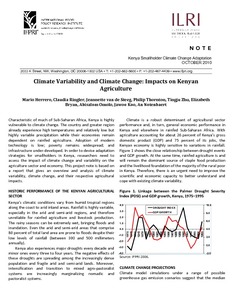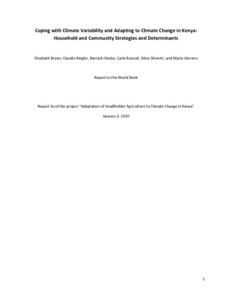Focal point
Location
About IFPRI
The International Food Policy Research Institute (IFPRI) provides research-based policy solutions to sustainably reduce poverty and end hunger and malnutrition in developing countries. Established in 1975, IFPRI currently has more than 500 employees working in over 50 countries. It is a research center of theCGIAR Consortium, a worldwide partnership engaged in agricultural research for development.
Vision and Mission
IFPRI’s vision is a world free of hunger and malnutrition. Its mission is to provide research-based policy solutions that sustainably reduce poverty and end hunger and malnutrition.
What We Do
Research at IFPRI focuses on six strategic areas:
- Ensuring Sustainable Food Production: IFPRI’s research analyzes options for policies, institutions, innovations, and technologies that can advance sustainable food production in a context of resource scarcity, threats to biodiversity, and climate change. READ MORE
- Promoting Healthy Food Systems: IFPRI examines how to improve diet quality and nutrition for the poor, focusing particularly on women and children, and works to create synergies among the three vital components of the food system: agriculture, health, and nutrition. READ MORE
- Improving Markets and Trade: IFPRI’s research focuses on strengthening markets and correcting market failures to enhance the benefits from market participation for small-scale farmers. READ MORE
- Transforming Agriculture: The aim of IFPRI’s research in this area is to improve development strategies to ensure broad-based rural growth and to accelerate the transformation from low-income, rural, agriculture-based economies to high-income, more urbanized, and industrial service-based ones. READ MORE
- Building Resilience: IFPRI’s research explores the causes and impacts of environmental, political, and economic shocks that can affect food security, nutrition, health, and well-being and evaluates interventions designed to enhance resilience at various levels. READ MORE
- Strengthening Institutions and Governance: IFPRI’s research on institutions centers on collective action in management of natural resources and farmer organizations. Its governance-focused research examines the political economy of agricultural policymaking, the degree of state capacity and political will required for achieving economic transformation, and the impacts of different governance arrangements.
Research on gender cuts across all six areas, because understanding the relationships between women and men can illuminate the pathway to sustainable and inclusive economic development.
IFPRI also leads two CGIAR Research Programs (CRPs): Policies, Institutions, and Markets (PIM) andAgriculture for Nutrition and Health (A4NH).
Beyond research, IFPRI’s work includes partnerships, communications, and capacity strengthening. The Institute collaborates with development implementers, public institutions, the private sector, farmers’ organizations, and other partners around the world.
Resources
Displaying 696 - 700 of 1521Bâtir sur les succès de l’agriculture Africaine
Les nouvelles sur l’état de l’agriculture en Afrique sont en grande partie décourageantes, mais on entrevoit des lueurs d'espoir. Quelques efforts stimulants réalisés par des agriculteurs et chercheurs africains au cours des dix dernières années ont sensiblement augmenté la productivité agricole dans certains pays et pour certains produits. Ces cas peuvent servir de modèles pour de futurs efforts, mais seulement si les responsables des politiques de développement et les professionnels comprennent les processus qui ont amené ces résultats, et les éléments clé de leur succès.
Climate variability and climate change: Impacts on Kenyan agriculture
Mapping risk and vulnerability hotspots in the COMESA region
Coping with Climate Variability and Adapting to Climate Change in Kenya: Household and Community Strategies and Determinants
Successes in African agriculture [IFPRI Issue Brief]
Agricultural growth offers a potentially powerful tool for spearheading broad-based poverty reduction in Africa. In a continent where 70 percent of the poor work in agriculture, an upsurge in farm productivity contributes directly to broad increases in rural income. In addition, a prosperous agriculture generates powerful growth linkages to the rest of the economy, providing cheap food, raw materials, and a growing demand for nascent processing and service industries.






